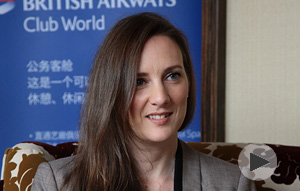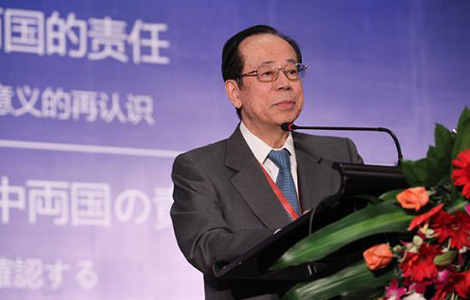Dare to speak English?
Updated: 2013-10-29 21:20
By Zhao Xinying (chinadaily.com.cn)
|
|||||||||||
|
 Two high school students buy goods from the foreign "owner" of a grocery store near No 2 High School Affiliated to Beijing Normal University on Monday. [Photo provided to China Daily] |
If you are a Chinese high school student and buy snacks from a grocery store near your school every day, can you imagine finding out one day that the store's Chinese owner has been replaced by a foreigner? Would you still shop there? Would you dare to speak to the "new owner" in English?
Students of No 2 High School Affiliated to Beijing Normal University encountered just that situation.
Two male students of the school walked into a small grocery store outside the campus on Monday afternoon and picked out something to drink. But when they were ready to pay, they found the familiar face of the Chinese owner had disappeared.
Instead, a foreigner was standing at the entrance of the store, carrying a bag for collecting money and asking, "Do you guys want the drink?"
Organized by the British Council, the activity, called "Dare to speak", aims to promote spoken English among high school students, college students, as well as white-collar workers.
And a foreigner selling goods at grocery stores is one of the scenarios the British Council designed for testing whether Chinese students would to speak or not.
The two students answered with a polite "yes", while the "new owner" asked, "do you know how much it costs?"
"Three yuan," the students said.
"Three? No, it's four yuan," the "owner" said.
"We are pretty sure it's three yuan," the students insisted.
"Well, good bargaining," the "owner" said, accepting the price offered by the students.
Alex, the "owner", is a freelance actor from London, hired by the British Council to test whether these Chinese students would talk to him.
"The 'testing result' is quite positive," he said. "Of course, not all of them would like to talk with me, but at least 30 percent dared to speak."
Taking several 1-yuan notes given by the students, the "owner" started chatting with the students.
"You have change?"
"Your English is good! Where have you been studying English? For how many years?"
"Do you have any plan to study abroad?"
Alex said the English-speaking level of the students is good, but not good enough. "After all, they are not native speakers," he said.
Xia Yichen, a senior student who talked to the foreign "owner", said the idea of the activity is interesting. He said he was surprised to see a foreign face in the grocery store he was familiar with, but he was not afraid to talk to him.
"In fact, we students have a lot of chances to meet and talk with foreigners in and outside school, so I decided to speak to him," he said.
"What's more, compared with reading and writing, I think English-speaking is a little bit easier for me, and I'd like to practice speaking English more," he added.
Lyu Hui, the product manager of IELTS in China, said they hope to encourage English learners and IELTS takers in China to speak out and practice more by setting up such real scenarios.
"We'd like to tell people that learning English is not only about taking examinations. Instead, communication is of greater importance," she said, adding that the slogan of the activity is "when the world comes to you, would you dare to speak to the world?"
According to Lyu, activities of such kind will also be held near Guomao, or the CBD of Beijing, with foreigners acting as taxi drivers to test whether white-collar workers will speak English to foreigners.
Today's Top News
Fonterra botulism scare laid bare in board inquiry
Apple's quarterly results disappointing
Experts quash Wi-Fi cancer rumor
Li gives credit to special friend from Germany
Lightening marriage over in a flash
Baidu's fund raises 1b yuan
Storm wrecks havoc in S Britain, leaving 4 dead
'Prime time' for Chinese firms to invest in EU
Hot Topics
Lunar probe , China growth forecasts, Emission rules get tougher, China seen through 'colored lens', International board,
Editor's Picks

|

|

|

|

|

|





